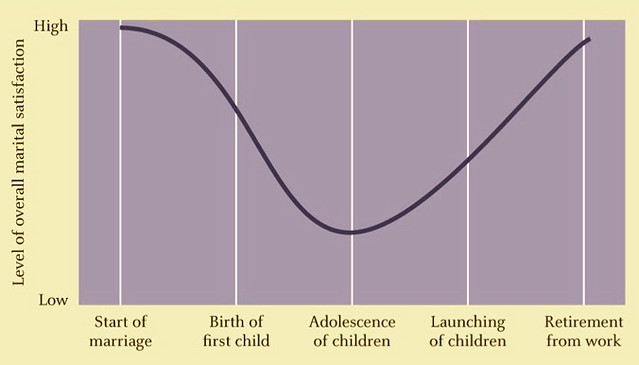To be honest, I didn't strictly buy into the gender role stuff taught by the church even when I was a TBM. I think part of that stems from the fact that I've never been a typical female. I'm not a tom-boy or anything---it's more like I'm gender-neutral.
So is my husband. About a year ago, I was driving my husband to work when we saw a billboard advertising a Men's Expo. My husband asked me if I thought there was anything at a Men's Expo that would interest him. We couldn't come up with anything. He's just not very interested in any typically male things like sports, guns, barbecues, etc. Later on that week we passed a billboard for a Women's Expo. I asked him the same question about me and again we couldn't think of anything. I'm not interested in fashion, makeup, scrapbooking, crafts, etc. Those things bore me to death. I guess the point I'm making is that we're not your stereotypical male/female. And for that reason, statements about essentialized gender characteristics don't really resonate with me personally.
Now, that's not to say that I don't think that male and female anatomy has no impact on who we are at all. Sexual dimorphism is obviously real and I think there is plenty of evidence to show that your hormones can have a dramatic influence on your personality and tastes. But although you can make broad generalizations about male and female chemistry and its influence on personality, there are just so many individual exceptions to that rule as to make those generalizations almost meaningless. For example, my dad was pushing my 2 year old son on the swings at a playground the other day. When my son started to say "Hiwaa!" I told my dad that meant he wanted to be pushed much higher. Dad replied, "He's definitely a boy." Sure---but that does nothing to explain why my other son (who is 4) won't go within 2 feet of a swing without crying uncontrollably.
The Family: A Proclamation to the World is NOT Revelation
One of the things that is important to recognize about the Proclamation is that it is not an official revelation. Church policy dictates that in order for something to be accepted as part of the official LDS canon, it must be presented for a sustaining vote to the world-wide church membership during a solemn assembly. To date, this has never happened. This is probably because the First Presidency and the 12 Apostles did not receive the Proclamation as revelation; it was crafted by them as a committee. (Frankly, the entire document is riddled with Dallin H. Oaksey legalese.)
As further proof of the Proclamation's lack of canonical status, note the revisions made to Boyd K. Packer's infamous October 2010 Conference address. In the original speech as it was delivered verbally, Packer stated:
Fifteen years ago, with the world in turmoil, the First Presidency and the Quorum of the Twelve Apostles issued “The Family: A Proclamation to the World,” the fifth proclamation in the history of the Church. It qualifies according to the definition as a revelation and would do well that members of the church to read and follow it.
In the printed version of the address that was published online a week later, the last sentence of that paragraph was struck out and replaced with: "It is a guide that members of the Church would do well to read and to follow."
Downgraded from "revelation" to "guide" in just a week's time? Not surprising. Leaving the Proclamation's canonical status ambiguous is the church's way of having their cake and eating it too. They want the members to treat it as though it were revelation, to give it the deference of canonized scripture. But they know that it is not---or have they even attempted to give it official canonical status.
Nevertheless, the average TBM treats it with canonical status, which means the Brethren have succeeded in making it virtually canonized. The reverence that church members give to the Proclamation reminds me of an interesting comment made by Randall Paul on an episode of the Mormon Matters podcast. While discussing the deference that contemporary Mormons give to the General Authorities, Paul stated:
When I was growing up, the marker [of loyalty to the church] was the Word of Wisdom. It was not sexual morality and it had nothing to do with the authority of the prophet. But now the Word of Wisdom has become so ubiquitous in Western culture that we've lost that marker and we're searching for a [new] marker. And we want it to be that the prophet literally is out there healing people on the streets, having angelic visitations all the time, stories about Jesus appearing to him in the temple telling him when the Second Coming is coming. We want another section of the Doctrine and Covenants every couple of years. That's what we really want a prophet to be doing. If you're a prophet: deliver! To me, the further we get away from Joseph Smith, the more it's becoming obvious that the Ensign and the Conference talks are not the Doctrine and Covenants. So in our own hearts, we want to give more and more power to the prophet for whatever he does because we know that's part of Mormonism. That's our marker: that we have a prophet.
Could a dogmatic adherence to the Proclamation be part of a desire to overcompensate for our prophet? To see evidence of a living prophet to help us find comfort in proclaiming to believe in one?
Male Spiritual Inferiority?
One thing that I feel I should mention is that I added some heavy-handed discussions about maternal gatekeeping to my Relief Society lesson partly to counteract the strong male-bashing that had occurred in Relief Society the previous week (while discussing Chapter 36 - The Family Can Be Eternal). The sister who had taught the lesson was an older single woman and perhaps was a little bitter about that or something. Several comments were made about how men needed marriage in order to tame their selfish and anti-social impulses. Some of the comments from the sisters astounded me. A few highlights:
- "My mother always used to say that an unmarried man over the age of 30 is evil."
- "A man is like a grape. You have to squash him and squish him over and over. And, if you're lucky, you'll get a little bit of juice from him."
- One woman told a story about how she came to hate her husband but stuck through the marriage so that her kids wouldn't have to go through a divorce. Yikes!
As a feminist, I basically don't believe that anyone should be limited or boxed in by their gender---male or female. Any kind of gender inequity or gender essentialization is flawed, in my opinion. But what is the source of all this male-bashing in a church context?
My money's on the priesthood, actually. The fact that the priesthood is only given to men brings gender inequality in the church to the forefront. (More on that in a minute.) Mormons acknowledge this inequity by talking regularly about why women don't need the priesthood to be equal. One of the ways Mormons have tried to cope with these stark inequities is to assert that males need the priesthood because they are spiritually inferior to women. So, in response to justifiable feminist critiques, Mormon culture has begun to posit that the priesthood is some sort of spiritual crutch for the weak, inferior male.
I frankly find that idea offensive. As a feminist, I believe in equality of the sexes; not that women should be given superior status over men. For that matter, I see no support for the idea of male spiritual inferiority in church doctrine. I think that men are just as innately capable of being a good parent, of expressing their feelings, of doing domestic chores, etc. If they are not, then I think social training is more likely to be the culprit than any kind of essentialized spiritual gender characteristics.
Presiding in Equality?
I mentioned earlier how the church tries to have its cake and eat it too by leaving the canonical status of the Proclamation in question. I think there are lots of other ways the Proclamation is an attempt by the church to have its cake and eat it too. The Proclamation wants to uphold traditional gender roles as having some sort of divine impetus while at the same time trying to deflect any criticism from feminists.
This tension is fairly obvious from this paragraph:
By divine design, fathers are to preside over their families in love and righteousness and are responsible to provide the necessities of life and protection for their families. Mothers are primarily responsible for the nurture of their children. In these sacred responsibilities, fathers and mothers are obligated to help one another as equal partners. Disability, death, or other circumstances may necessitate individual adaptation. Extended families should lend support when needed.
To me, this paragraph is contradictory. How can a father preside over his family and still be an equal partner with his wife? M-w.com says the word preside means "to exercise guidance, control, or direction" and "to occupy the place of authority." In fact, the word president and preside both from from the Latin root word praesidere (prae = "before" and sidere = "to sit," literally meaning "to sit before"). Praesidere originally meant to "stand guard" and it morphed into the French word présider by the 1600s which meant to "preside over, to govern." In short, the word "preside" is loaded with hierarchical intonations, implying one who is in a position of authority to make decisions and to rule over those that he governs. There's just no getting around that.
Now, let's take the most pro-feminist statement from the Proclamation (and which I made the star of the show in the lesson I taught in church): "In these sacred responsibilities, fathers and mothers are obligated to help one another as equal partners." Lest you think for a moment that this is implying that women can help their husbands do any breadwinning, there is a clarifying statement just afterwards that undercuts it, implying that only in situations of disability and death should there be any "individual adaptation."
In fact, one time (when I was still a TBM), I was having an argument about women working outside the home with a family member and I brought up the line about helping each other in their responsibilities from the Proclamation. My family member used the sentence about death and disability to argue that it wasn't the intention of the General Authorities to suggest women should work outside the home in any other circumstances except those ones. So, I guess that means it's okay for a man to help with the role of nurturing but it's inappropriate for a woman to help with the role of breadwinning? Seems like a convenient double standard to me.
Authority within Church Government
What I find most problematic of all is how a male-only priesthood plays out within church government. Women are virtually powerless to assert any change within the church. While an assertive woman can certainly speak her mind and offer a suggestion to a priesthood leader, the male has full control in deciding whether to implement that suggestion or not. It's true that most men in the church will never be in a position of authority in which they can implement changes in their church community---but they at least have the remote possibility they will one day be in a position of authority. By contrast, a woman has a 0% chance of being a position of authority. And that has serious ramifications for the church. If you deny half of your population a voice in how your institution is governed, you run the risk of being dramatically short-sighted in meeting individual needs. (I contend that a female prophet would NEVER have instituted the 3-hour block, for instance.)
That being said, I read an interesting piece in Mother Jones about how Christian mega-churches are targeting the male in the household most of all. They find that if they can get the father to come to their church, they've got the whole family. Perhaps it works the same way in our church. Could a male-only priesthood be so attractive to men that it makes them want to come to church, pay tithing, and do the whole rigamaroll---and bring their families with them? If so, maybe it's a necessary form of institutional self-preservation to deny women the priesthood. But even if that were true, it's no excuse for the frankly egregious gender gap that exists in this church.
Fortunately, one of the fringe benefits of losing my faith is that I no longer have to do the mental gymnastics to make excuses for the poor treatment of women in the church any more. I no longer have to wrest the Proclamation until it is compatible with feminism. I can easily disregard it as being the product of a group of male geritocracy that actively tries to suspend the church's culture in the 1950s. I don't think it's out of a malicious intent to suppress women. I honestly think it's just that the 15 elderly men grew up in a different era and in a different time. They make certain assumptions about the world that someone who with a different life background just wouldn't make. And that's exactly why women are so badly needed in leadership positions.
Footnotes
[1] There was also a discussion during this lesson about how getting married earlier is better than getting married later in life because you "don't have time to develop negative personality traits that could hinder a marriage." That's just simply not true. Statistically, the highest predictors for marital success are having an education and getting married when you're 25 or older. I'm willing to bet that this statistic can largely be explained by the fact that the human brain is literally not fully developed until you're 25. It makes sense that someone with a steady income and a mature brain would have higher marital success.


